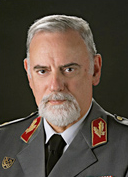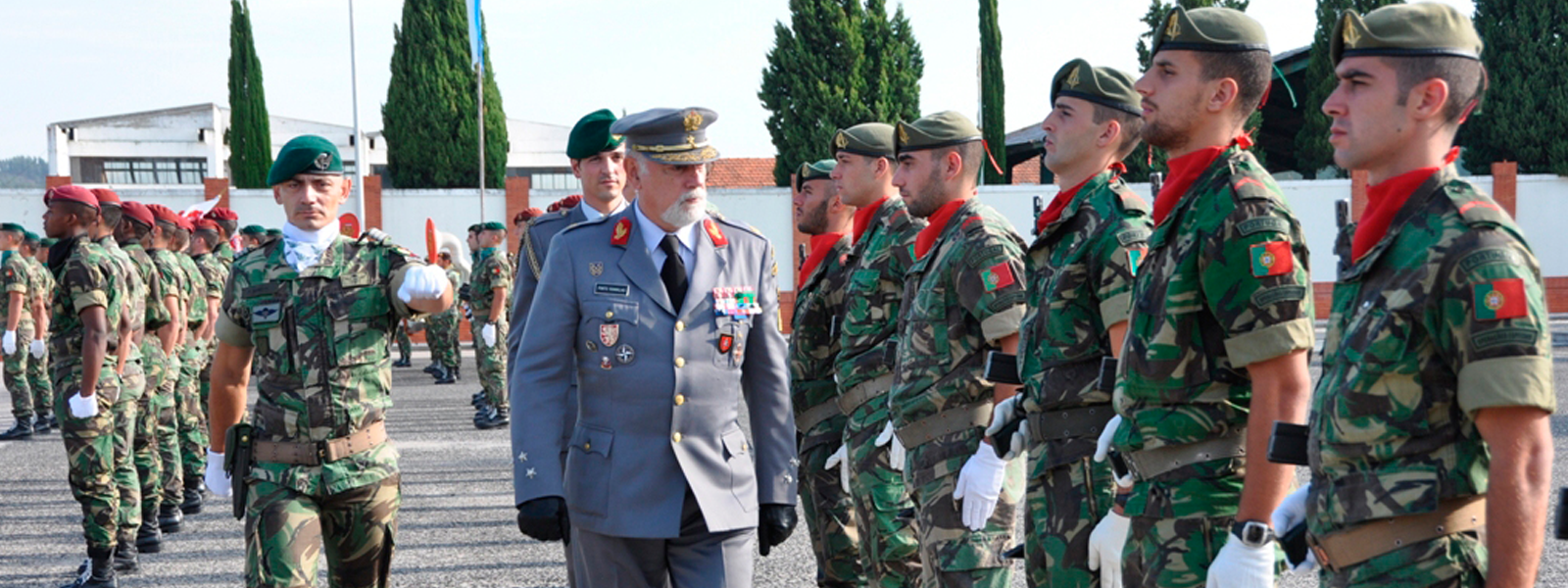First I would like to thank the invitation to participate in this important conference. I presume that it is expected from me an open approach to the subject as well as the knowledge of the reality from someone who had the responsibility to commit military forces in operations.
I know the operational theatres of Afghanistan, Kosovo, B-H and Lebanon and so what our soldiers need and deserve in what training and equipment are concerned in order to guarantee their survival and success.
So, allow me as an Army General, to centre my reflexions over some political decisions that can bring difficulties to the armed forces in general and land forces in particular.
I start by saying that I am a clear supporter of the Alliance, of its continuity and that I do not see any credible alternative recognising its role in the transatlantic strategic solidarity.
On the other hand I am not an enthusiastic defender of smart defence and pooling and sharing concepts because I have some doubts about their effectiveness in the Alliance capabilities.
My considerations will be on what I think those concepts should not be or should not allow to happen.
Smart defence and pooling and sharing cannot be a strategic option to save money by redefinition missions and structures of the armed forces and their capabilities.
During my last five years as chief of army staff, living with the European economic crisis I always faced budget reductions, constrains and cuts in personnel, reductions of the procurement law and delays in the fundamental projects, as helicopters or IFVs (armour tactical vehicles 8x8 and 4x4) for example. And this did not happen only in my country.
In matter of defence, looking for saving money and conducting reforms has always been synonymous of reductions and the restructuring of capabilities has resulted in the elimination of some or freezing them in the near future.
In political assessments it seems that equipment like tanks, artillery and tactical air defence are no longer needed.
I also think that some political considerations should be taken in account in the future strategic options related with smart defence and pooling and sharing.
As a fundamental consideration we should pay attention if we are planning for wars we want to fight rather than for wars we will have to fight.
We will probably continue to see an arch of instability stretching across north African coast and through the middle east as well as in the south west Asia as well as transnational terrorism.
We are seeing now the spreading of nuclear and ballistic missile technology and we have also some doubts about the potential behaviour of great powers like China or India.
Necessary arrangements were made to respond the new threats and asymmetric warfare and they will always remain but it isn’t a prudent option to ignore for the future the symmetric threat.
We are looking for savings in defence to favour the national economies when we consider the potential results of smart defence and pooling and sharing, but we have to recognize that, and I quote the NATO SG, “we are not talking about the world economy but about world order and we should prevent that the financial crisis doesn’t become a security crisis”.
Our strategic planning is affected by the consequences of the financial crisis and this situation is the main driven factor for our strategic objectives in matter of defence and not the potential threats.
In this context smart defence and pooling and sharing are thought as helping tools or solutions but it matters to know how.
It is important to remember that economy needs security to progress and consolidate and security is also about military capabilities, not only to defend and protect populations against new threats but also to keep international peace and stability as well as to be engaged in crisis prevention and management when necessary.
Maybe we are facing two different perceptions in NATO: the politicians and the military seem to have different expectations concerning the results of those helping tools.
I mentioned two perspectives but the defence industries probably have a third one, related to the industrial interests in both sides of the Atlantic and even the EDA says, and I quote: “if smart defence and pooling and sharing goes well, this means business and jobs”.
I’m sure that all of them, at the end, want an Atlantic Alliance as a coherent multi-tool political and military, able to grantee the stability, solidarity cooperation and its transatlantic cohesion. But we have to establish the adequate mechanisms, tools and procedures.
The options in matter of defence and Alliance military capabilities should avoid the idea of division of labour within NATO - with the US providing hard power and European allies the soft power like training and institutions building or security reforms in crisis areas. This is a naive expectation and probably very dangerous for the Alliance cohesion.
The consequences of unbalanced capabilities within the Alliance, added to a deep specialization of some European Allies, bring in the strategic risk of an also divided Europe that will undermine at the end the principle of collective defence (article 5).
This situation should be avoided because it can create a weaker Europe and affect its capacity to prevent and manage crises, which can compromise the transatlantic solidarity in matter of strategic defence.
In matter of Alliance capabilities we cannot create a “step back” when we consider its capability during the cold war and immediately after the fall of the Berlin wall.
Speaking about capabilities we have to relate them to the operational level of ambition, assumed by the Alliance (2+6); is NATO ready to consider the revision of that level of ambition if the members are not able to build up the required capabilities? I think that from the political and military point of view, it will be a critical situation that can erode the Alliance cohesion.
Smart defence depends on three pillars - pool and sharing capabilities; setting the right priorities; better coordination among allies. Allow me two questions: first, how we will fulfil the short falls of the Alliance without compromising national essential capabilities, in particular, for European allies with less resources or minor strategic dimension; second, how to grant what we can call “the strategic security supply” to a member that has given up some capacities and needs them to face a strategic national challenge outside the Alliance.
Considering the European members with minor strategic dimension and facing economical problems we must have in mind that those military capabilities once dismantled, hardly or even never will be rebuilt with the strategic implications either for those countries or for the Alliance.
We cannot ignore that there are some voices suggesting the use of pooling only for resources that are not sent to war as training and maintenance facilities, schools and laboratories, for example; others are concerned about not being able to use their capabilities when they want to.
NATO is not a supranational organization, so the access and employment of capabilities in the pooling and sharing concept, has to respect the decision process in every member countries, involving parliaments, presidents and governments, and this takes time.
In relation to the national specialisation, beyond the sensitive implications for each country sovereignty, we must remember that it can eliminate capabilities to participate in crisis management or artº 5, and it shows the evidence of significant vulnerabilities in the international geostrategic environment, especially in the regional context. This national specialisation should, in other way, be considered in niches of excellence, available for a coalition or multinational formations.
Pooling and sharing isn’t new. For decades we have seen several members states share important capabilities with others, through various bilateral and multilateral arrangements, and also some specialisation, but they never as been able to go over the tactical level, the project by project and, more important, they have not solved the strategic short falls of the Alliance.
Smart defence is especially meaningful for the European members of the Alliance which are too much dependent from the US military capabilities; this fact surely has implications in defence budgets having in mind that either the US President or the Republican candidate have already declare to consider the defence budget untouchable.
In my point of view, pooling and sharing and smart defence should focus in resolving the problem of short falls of the Alliance, in order to keep the European military capabilities relevant and act as opportunities for cooperation and modernization of air, naval and land components.
The options taken under the smart defence concept make sense if we consider the strategic interest of the projects that fulfil the Alliance shortfalls, their dimension, associated technology and financial costs.
I am referring to the Missile Defence, Surveyance and Reconnaissance, Air to Air Refuelling, Strategic Airlift considering also that the concept can be extended to the Cyber Defence.
The smart defence concept should go further than capability problems aiming a broader strategic discussion as well as the diffusion of the lessons learned into the Alliance, promoting the military education and training.
Capacities belong to governments and NATO cannot allow the idea that smart defence and pooling and sharing are opportunities to spend less money and to dismantle capabilities. The idea of saving money in defence and raising the issue that armed forces as they are today are not sustainable in the present moment of economical difficulties are something that finance and defence ministers love to hear.
The political will to conduct the smart defence and pooling and sharing concept in a way that favours the military capability of the Alliance is crucial; considering the present European economical environment in order to prevent its perverse application that political will should be stimulated or eventually promoted. It will be interesting to know the defence package in this domain that will be approved in the Chicago Summit and afterwards the way it will be put in action.
One last word about missile defence: everybody understands the interest of the Alliance to have a new strategic non nuclear tool, able to ensure deterrence and a credible dissuasion as well as an instrument to prevent crisis and its management in a context of comprehensive approach.
But for missile defence to be an effective tool for deterrence and a real collective commitment and contribution, conditions are needed for everybody to participate according his possibilities in the different areas of sensors, interceptors, command and control or battle management.
We are obliged to establish the best procedures and mechanisms to get the best solutions and the best results. For the sake of the transatlantic security, NATO should continue to be in the future a political and military alliance that will keep strong the transatlantic link, and able to demonstrate in all situations, political solidarity, burden sharing on responsibilities and capabilities and to commit military forces in operations.
Thank you for your attention.
* Intervenção, na conferência realizada em Madrid “Smart Defence, International Seminar”, em 26 de Abril de 2012. Esta conferência foi conduzida pelo INCIPE de Madrid, com o patrocínio da OTAN e Embaixada Americana em Madrid e insere-se no ciclo de conferências que antecedem a cimeira de Chicago a realizar em 20/21 de Maio, deste ano.
** Presidente da Direção da Revista Militar.



